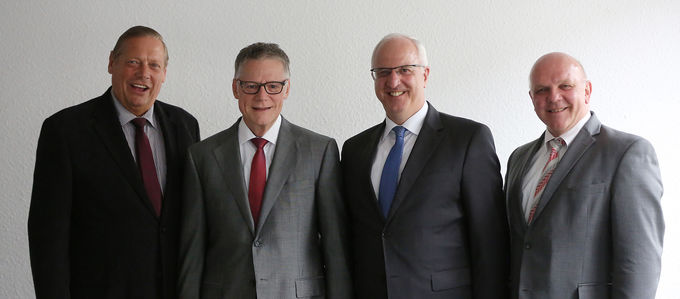
WG CDR—an awkward acronym. Previously the committee was called “Project Group Ecumenism”. The name change became effective in February 2011. The committee went from project group to working group status. It will act as a contact not only for Christian denominations, but for all religions of the world.
The abbreviation CDR stands for “Contacts with Denominations and Religions”. The aim is clear: the leadership of the international Church wants to nurture contacts beyond confessional boundaries. “Contacts to other world religions are included and have the objective to dismantle prejudices and fear through dialogue and to promote mutual respect,” it said in a corresponding press release in 2011.
Established in October 1999
The members of the group are Apostle Volker Kühnle (founding member and chairman of the working group), Apostle Rolf Wosnitzka (member since February 2007), Apostle Clement Haeck (member since April 2015), and Bishop Peter Johanning (founding member). The group was formed by Chief Apostle Richard Fehr on 28 October 1999. He sent the members off to work with a fervent prayer. Chief Apostle Leber, his successor, supported the work of the group intensively just as Chief Apostle Schneider is doing now.
Visits, meetings, sensitivities
Years of learning and dialogue followed. The working group has visited numerous ecumenical institutions, knows their contacts, and is aware of existing sensitivities. Also bilateral meetings have taken place, such as at the Vatican with the president of the Pontifical Council for Promoting Christian Unity, Cardinal Walter Kasper and Cardinal Kurt Koch, and with leaders of the Protestant Churches, as well as with Methodists and Adventists. Talks at the World Council of Churches in Geneva have shown how important relationships to ecumenical institutions are at the local and national level, before contacts can be established with the World Council of Churches.
Twice already, the working group has accepted invitations to participate with an information stand at a convention of the Evangelical Church in Germany: in 2013 in Hamburg and in 2015 in Stuttgart. Also at our own International Church Convention in Munich in 2014, the ecumenical movement was on the agenda. Several thousand people attended a discussion held in one of the halls. And they made very clear which statements and views expressed on stage they supported. The panellists from the various denominations almost seemed surprised how open the audience was. Professor Dr Helmut Obst, for example, conceded that today he would no longer use the subtitle Die exclusive Endzeitkirche? (“The exclusive Church of the end-time?”) on his standard work on the New Apostolic Church, published in 1996.
Guest status in the ecumenical movement
Since April 2014, the New Apostolic Church in Switzerland has enjoyed guest status in the Association of Christian Churches (ACC-CH). Apostles Heinz Lang and Volker Kühnle travelled to St Gallen to accept the membership certificate. The decision of the Association of Christian Churches in Switzerland to grant guest status to the New Apostolic Church was unanimous. They stated in their press release that the New Apostolic Church had undertaken significant efforts in the ecumenical movement.
The New Apostolic Church in Germany is also aspiring to achieve guest status on the national level. The talks are ongoing. A “phase of communication and reflection” initiated by the Association of Christian Churches in Germany will end this fall. “Now that so much has been set into motion on the local level, it is up to the working group to attain guest status on the national level as quickly as possible,” Apostle Volker Kühnle, the chairman of the group says. Some 80 New Apostolic congregations across Germany are members in nearly 40 local chapters of the Association of Christian Churches—mostly with guest status.
In Austria, the New Apostolic Church is a member in the National Youth Council of Churches and in Luxembourg the New Apostolic Church enjoys guest status on the national level. Also outside of Europe contacts have been established and are being fostered. New Apostolic District Churches in India, Argentina, and in some countries in Africa have been members of the respective National Council of Churches for years or foster close contact with these.




